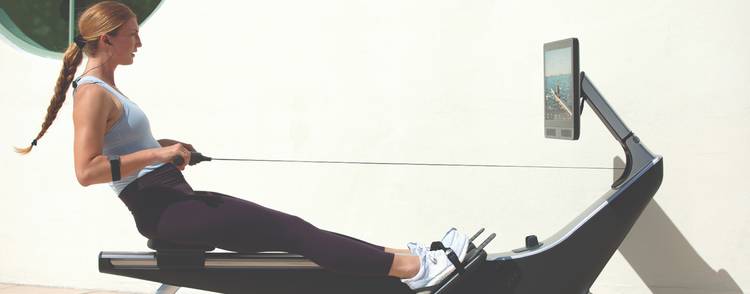- Remind you when you’re slacking – or pushing too hard.
- Allow you to exercise safely
- Show progress that doesn’t register on any weigh scale.
- Can accurately track calorie ‘burn’
- Give real, accurate feedback that may be different from your ‘perceived exertion.’
How does it work?
Actually very little equipment is required. Modern monitors may be a combination of a chest strap that records the heart rate and a wristwatch which receives the signal and also gives you a visual readout of your heart rate. (cost approx. $58-$350+) The chest strap has electrodes in contact with the skin to monitor the electrical voltages in the heart. Each time a heart beat is detected a radio signal is transmitted to the receiver unit which determines the current heart rate. The receiver unit doubles as a watch and some models also include extra features that make it even easier to use; tracking calorie expenditure, fitness tests, and the ability to upload data to your computer. There is also the Mio brand of heart rate monitors which don’t require the chest strap and has tested as accurately as the monitors that do require the extra strap.
What are the real benefits??
How about safe weight loss or even a fitness performance epiphany! Both can be realized through heart rate monitoring. It is also valuable when starting a new fitness program to understand your limits and exercise in the appropriate Heart Rate Zones. (more on this later)
Achieve your WEIGHT LOSS GOALS
You get feedback on real progress in cardio-conditioning that does not visibly show as weight loss. This keeps you from getting discouraged early on and giving up on a fitness regime.
“It’s simple: If you know how many calories you burn during exercise, you can more effectively plan your dietary intake so that you expend more calories than you take in each day. A heart rate monitor also helps you track your progress. You’ll know how many calories you are burning each day and how much your fitness is improving. This type of feedback can be extremely helpful as part of a weight loss program. Because a heart rate monitor can accurately measure the energy expended during most forms of physical activity, you are more likely to adopt a diet that leads to weight loss. Knowing your body through the use of a heart rate monitor is a good place to start.” http://www.numetrex.com/index.php?section=coachscorner&id=66
Achieve your FITNESS PERFORMANCE GOALS
By allowing you to train to your limits and understanding what those limits are, you can achieve performance goals that may have previously seemed impossible.
“For many competitive athletes, every week’s workout regimen is essentially a seven-day dance along the fine line between optimal training and over-training. Using a heart monitor to avoid stressing your body too much means that you will maximize the efficiency of your training, while minimizing the opportunity for injury. Injuries are much less likely to occur when you are not over-taxing your body, and avoiding injuries is tantamount to avoiding setbacks in your training. Different terrain, different energy levels, inconsistent distance measurements, and any number of factors can mislead you into thinking that you have performed well or poorly when the opposite may be true. Your cardiovascular performance is best measured by the work-rate of your heart, so pacing your training runs according to your heart rate is the best method of targeting your cardiovascular fitness as you do your workout.” http://www.marathonguide.com/training/articles/HeartMonitorTraining.cfm
Fern Oliner had been a runner for more than 25 years when she experienced a breakthrough in her performance. It happened at age 59, during a challenging half-marathon. “For the very first time, I felt like a true runner,” she recalls. “There I was on the uphill, passing people and feeling totally in control. I absolutely loved it.”
Her secret? Oliner was wearing a heart-rate monitor. “I was breathing heavily as I was going up the hills, but the monitor told me I was okay. So I sped up,” she says. “If it weren’t for the monitor, I would’ve kept running at the slower pace, as I’d always done.”
http://www.runnersworld.com/article/0,7120,s6-238-267–1039-1-2X5-3,00.html
See also:
Regarding the the accuracy of Heart Rate Monitors
Physical Activity Assessments for Health-Related Research
By Gregory J. Welk
Using Heart Rate monitors for General Fitness
Walking Magazine’s the Complete Guide to Walking for Health, Weight Loss …
By Mark Fenton

